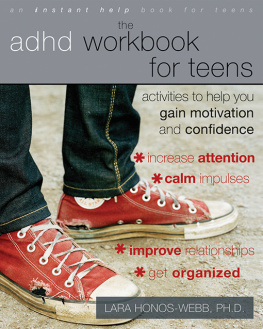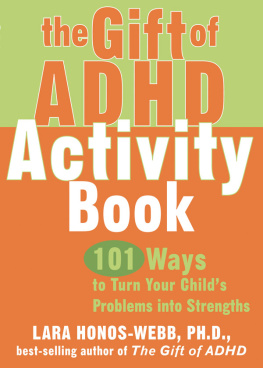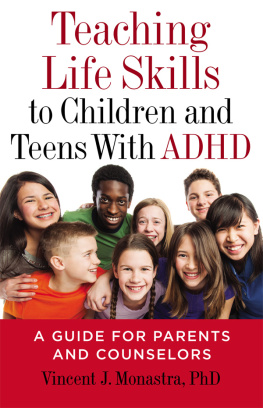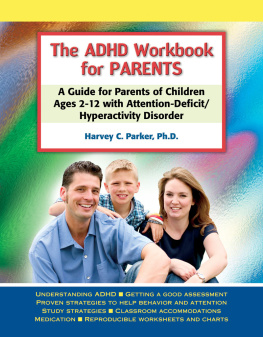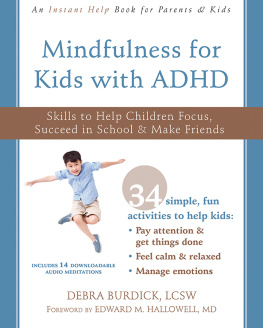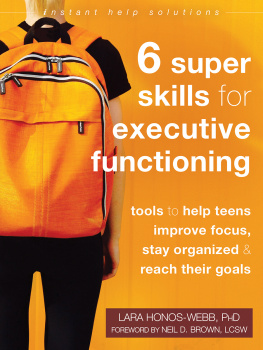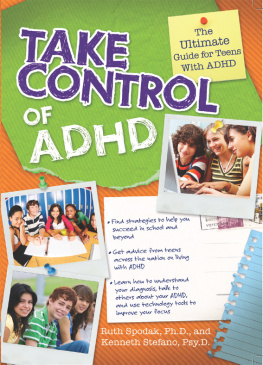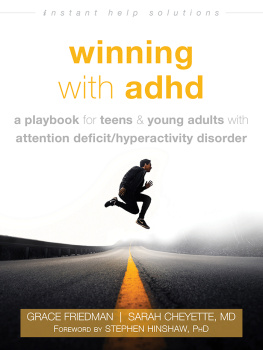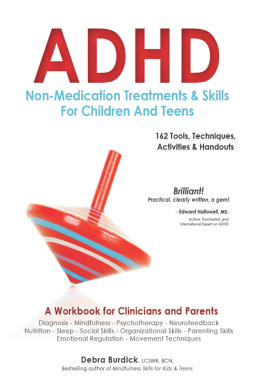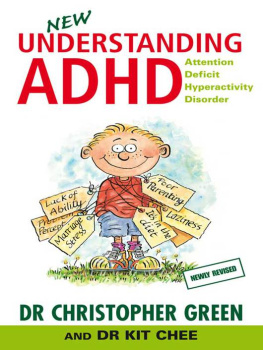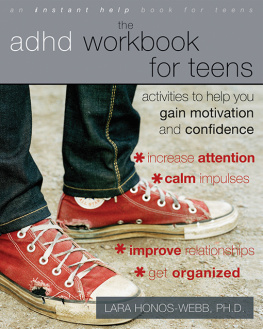Lara Honos-Webb, Ph.D., is a licensed clinical psychologist in private practice in the San Francisco Bay Area. She is author of The Gift of ADHD, The Gift of ADHD Activity Book, The Gift of Adult ADD, and Listening to Depression. Her work has been featured in Newsweek, the Wall Street Journal, and newspapers across the country. She has appeared on national radio and television programs. For more information about Honos-Webb and her work, please visit www.visionarysoul.com.

Lara Honos-Webbs book contains forty activities for helping teenagers with ADHD thrive and excel at home, in social situations, and at school. The ADHD Workbook for Teens is an essential guide that will help teens with ADHD have successful lives.
Stephanie Moulton Sarkis, Ph.D., NCC, LMHC, author of 10 Simple Solutions to Adult ADD, Making the Grade with ADD, ADD and Your Money, and Adult ADD
This thought-provoking workbook offers teens confidence, reassurance, motivation, and insight. Thank you, Lara Honos-Webb, for letting teenagers know that ADHD is a gift that is full of opportunities. Its a message teens with ADHD deserve.
Robin Goldstein, Ph.D., faculty member at Johns Hopkins University and author of The New Baby Answer Book.

Publishers Note
This publication is designed to provide accurate and authoritative information in regard to the subject matter covered. It is sold with the understanding that the publisher is not engaged in rendering psychological, financial, legal, or other professional services. If expert assistance or counseling is needed, the services of a competent professional should be sought.
Distributed in Canada by Raincoast Books
Copyright 2010 by Lara Honos-Webb
Instant Help Books A Division of New Harbinger Publications, Inc.
5674 Shattuck Avenue
Oakland, CA 94609
www.newharbinger.com
Cover design by Amy Shoup
All Rights Reserved
Library of Congress Cataloging-in-Publication Data
Honos-Webb, Lara.
The ADHD workbook for teens / Lara Honos-Webb.
p. cm.
Includes bibliographical references and index.
ISBN 978-1-57224-865-6 (pbk. : alk. paper) -- ISBN 978-1-57224-866-3 (pdf ebook : alk. paper) -- ISBN 978-1-60882-202-7 (epub ebook : alk. paper) 1. Attention-deficit disorder in adolescence--Popular works. 2. Attention-deficit disorder in adolescence--Problems, exercises, etc. I. Title.
RJ506.H9H656 2010
616.85'8900835--dc22
2010040282
I gratefully dedicate this book to Ken, Kenny, and Audrey Webb for giving me the gift of waking up happy every day.
A Note from the Author
Dear Reader,
This book offers you a chance to make a major change in your life: to begin to define yourself by what you do well rather than by your weaknesses. For the rest of your life, you can benefit from focusing on what is working rather than what is not working.
Sometimes teens with ADHD think that they are not on the same playing field as others, but that is not true. ADHD does, however, present many challenges for teens, and this book will give you tools to deal with those challenges. For example, you will learn some basic resources for building your motivation and confidence, which can help you achieve the goals you set for yourself.
ADHD comes with gifts as well as challenges. You will learn to find your gifts and interests and use those to build your motivation and confidence. Many teens with ADHD are creative, emotionally sensitive, and good at reading others. While these very gifts may create challenges in getting good grades, they offer opportunities for success in many arenas and career choices.
Youll read success stories of teens who overcame the significant challenges of ADHD. Youll meet teens who increased their motivation by realizing that there were many careers that involved their most passionate interests and didnt require them to sit still all day. Youll meet teens who gained confidence as they discovered their many gifts they had literally not been paying attention to. Youll meet teens who built skills for staying organized and finding resources to solve specific problems of ADHD.
Although you may be tempted to skim through the book, I encourage you to slow down and actually complete the activities. Youll be amazed at how simple shifts in perspective can bring you lasting benefits. You can practice skills like challenging negative thoughts that pop up in your mind and deep breathing to calm yourself down. You will learn to take control of your thoughts and to feel emotions that can lead to healing. The harder you try, the more you can change your life.
Activity 1: having ADHD
for you to know
Having ADHD means that you are different from others in what you pay attention to. Your teachers and parents may complain tahat you have difficulty focusing on schoolwork or following directions. Others may complain you are too hyper. Your own reactions may vary as well; its normal to have mixed feelingsboth positive and negativeabout the diagnosis of ADHD.
Robby was relieved when he found out that he had ADHD. It helped to explain why he struggled so much in school, but he was still afraid he would never measure up to others.
When Megan was diagnosed with ADHD, she thought it meant that she was not as smart as other kids.
Jacob actually hoped he had ADHD. He told his mom that all the cool and creative kids in his school had ADHD.
for you to do
Did you feel better about yourself before or after you got your diagnosis?
____________________
____________________
____________________
What was the upside of getting the diagnosis?
____________________
____________________
____________________
What was the downside of getting the diagnosis?
____________________
____________________
____________________
How has your diagnosis helped you better understand yourself?
____________________
____________________
____________________
and more to do
Different people have different ideas about ADHD. Tell whether you agree or disagree with these two statements, and why.
Teens with ADHD are less intelligent than others.
____________________
____________________
____________________
Teens with ADHD are creative, unique, and gifted.
____________________
____________________
____________________
What are some other things you think or have heard about ADHD?
____________________
____________________
____________________
Activity 2: when is your ADHD a problem?
for you to know
Your ADHD symptoms may create problems at times, but in many situations they won't. For example, the more interested you are in a subject or activity, the more you will be able to focus and pay attention. If you can figure out when your symptoms are at their worstlike in a classroom or sitting through long lecturesyou will know when you most need to work on dealing with them.
Scott got good grades in school even though he had ADHD, but he kept getting into trouble because he couldnt sit still and because he goofed off with his friends in class. When his teacher realized that sitting near his friends made it hard for Scott to pay attention, she changed the seating arrangement, and he no longer got into so much trouble. She also allowed him to sit on a large inflatable ball so that he could gently move around at his desk, which helped him concentrate.

